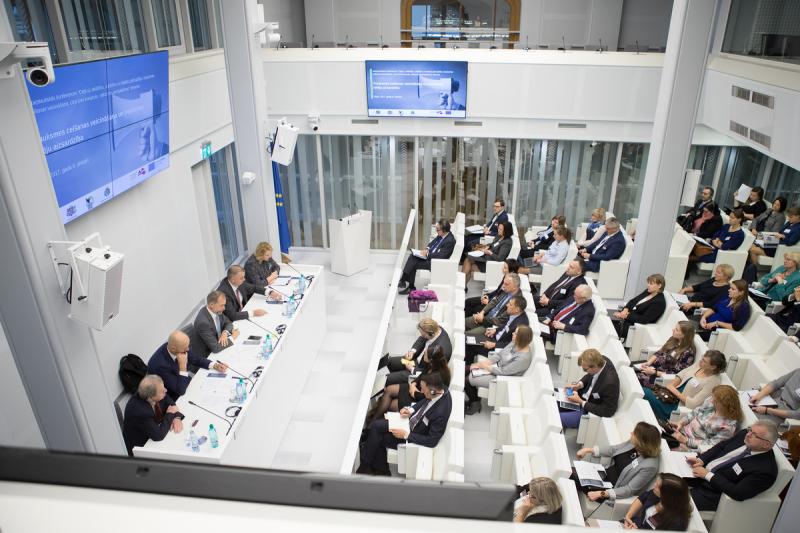Whistleblowing – an opportunity for everyone to promote lawful, fair, open, and transparent working environment by exercising the right to freedom of expression.
The Whistleblowing Law helps Latvian citizens to prevent violations and harm to public interests and at the same time protects whistleblowers from reprisals. The new Whistleblowing Law which transposes the EU Whistleblower Directive and improves the current approach is in force in Latvia as of 4 February 2022.
What is a Whistleblower?
Whistleblower – a natural person who provides information on a possible violation which may harm the public interests if the person considers this information to be true and it has become known to him or her while fulfilling the work duties or establishing legal relations related to the fulfilment of work duties, or while being in traineeship, and who might be subjected to retaliation for the provision of such information.
Internal Whistleblowing System of the State Chancellery
Any employee of the State Chancellery may inform through the internal whistleblowing system of such alleged violation observed in their workplace which can cause harm to the public interest. Whistleblowing helps to prevent a violation early before any damage has been caused to the reputation of the institution or public administration or any losses have been incurred. The employees of the institution are the ones who can notice potential violations and assess the dangers associated therewith based on their professional knowledge and experience.
Through an internal whistleblowing system, the report can swiftly reach the responsible persons, and the expressed concerns can be swiftly evaluated, and thus a possible violation can be prevented and systemic deficiencies can be identified.
Reporting to the State Chancellery as the Competent Authority
Any citizen may blow the whistle to the State Chancellery on an alleged violation within the areas of competence of the institution which they have observed in their work-related activities and which can harm public interests. Employees of subordinated institutions can also report to the hierarchically higher institution as the competent authority.
A whistleblowerʼs report can be submitted to the State Chancellery by any of these options:
- E-mail at: trauksme@mk.gov.lv (preferably with a downloaded and filled form; must be signed with a secure digital signature);
- Online form on the web page trauksmescelejs.lv;
- Post to address: Brīvības bulvāris 36, Rīga, LV-1520 (it must be noted that it is a whistleblower report inside the letter, not on the envelope) (must be signed by the whistleblower);
- In person: bring to Brīvības bulvāris 36, Rīga, and drop in the post box for whistleblower reports right after the entrance of the cloakroom (must be signed by the whistleblower);
- Through the general channels of communication with the institution (via mail to the address of the institution, e-mail address or electronic address of the institution, or by submitting it in person);
- Through the website trauksmescelejs.lv (by clicking on “Iesniegt ziņojumu” (Submit a report) – “Iesniegt ziņojumu elektroniski” (Submit a report electronically)).
The form of the whistleblowerʼs report is available for downloading on the website trauksmescelejs.lv (click on “Iesniegt ziņojumu” (Submit a report) – “Lejupielādēt veidlapu” (Download the form)). It is advisable to submit a whistleblowerʼs report by using this form.
The report can also be submitted by other means which the whistleblower finds suitable.
When submitting the report in paper form, it must be signed by the person. The whistleblowerʼs report sent via e-mail must bear an electronic signature.
If the report is submitted by means other than the special whistleblowing channel, a clearly visible indication “Trauksmes cēlēja ziņojums” (Whistleblowerʼs Report) must be attached to the document (for example, indicating it as the headline of the submission or e-mail message or on the envelope).
Process after Report Submission
The conformity of a whistleblower’s report to the requirement of the law must be assessed within 7 days after receipt of the report. Then the person who submitted the whistleblower’s report must be informed of the taken decision within 3 days.
If a submission is not recognised as a whistleblower’s report, it shall be examined under general procedures.
If a submission is recognised as a whistleblower’s report, the whistleblower will be informed of the progress of examination not later than after 2 months. The whistleblower shall also be informed of the result of examination.
Any person (institution) who has received or performs any activity with a whistleblower’s report has the responsibility to ensure due protection of the whistleblower’s personal data. The whistleblower’s personal data may be accessed only when necessary for the examination of the whistleblower’s report or for the examination of the case opened as a follow-up to the report, or for the protection of the whistleblower or their relatives or associated persons. Detailed information on the protection of whistleblowers is available on the section of the website trauksmescelejs.lv about protection (in Latvian).
After a submission of a person has been recognised as a whistleblower’s report, the whistleblower’s personal data are pseudonymised.
The whistleblower’s personal data, the whistleblower’s report and the written or material evidence attached thereto, as well as the whistleblowing materials have the status of restricted access information.
Contact Person of the State Chancellery in Matters of Whistleblowing:



